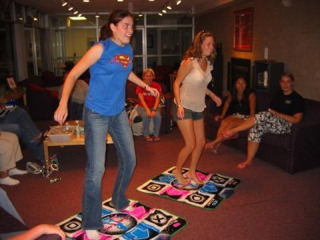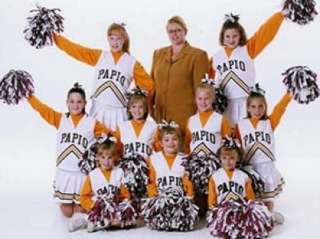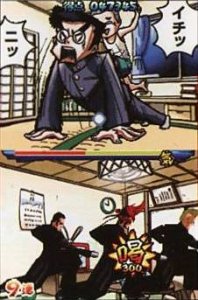See? We can do hardcore if we want.
By Romanista
You may have heard rumours about a cheerleading game from those crazy Japanese. Well, put aside any fantasies you may have about being the highschool quarterback who got to take the cheerleader to the prom, dozens of girls with pompoms dancing in the aisles – although you can probably buy just that game if you look hard enough and, no, we won’t tell you where to look you filthy pervert - what we have here is a professional cheering squad, Men in Black style.
Rhythm games came relatively late to me. Sure, I had seen some people moving about on Konami's Dance Dance Revolution (DDR) in the few arcades our small country has. But, as you might know if you have seen the Dutch dance, that wasn't a very pretty sight. Then, two years ago, the Dreamcast entered my life and with it came a little game called Samba de Amigo. As I had just been to Rio, this sounded like a good way to retain my memories from La Terra Encantada.

Who needs a Discothèque.
When I obtained some Maracas to play the game with, one could see me getting a workout and my girlfriend trying to shut the curtains as soon as she noticed me playing. Soon afterwards the drums from Donkey Konga arrived and every friend who entered just had to have a go on the bongos. These games made you feel like you were musician, even if you were just following strict orders when to push a button. Take the instruments away though and try and play using a standard controller and what do you have left? No Bongo, No maraca, just pressing a button. It's more like working in a factory than playing a game.
This is where Osu! Tatakae! Ouendan! steps in. It takes the basics of hitting a button on a beat and expands on it greatly. For starters, there’s more here than just hitting the beat – different strokes are required for different actions, ranging from simple tap the circle at the right point, through guiding a ball along a track with the stylus and spinning a wheel like the International Superstar DJ that you’ll never be. All this is made possible by being a game on the DS of course. This way it removes the problem of having a nicely hittable controller by actually adapting your virtual controller as the game is being played.
Furthermore, it changes the setting from a song to an adventure where you play the Cheering Squad. You follow the Squad while it rescues the inhabitants of a virtual city by cheering them. In every level the game starts with someone crying "Ouuueeeeendan!" and the cheering squad coming around to help them. The story is laid out in simple Manga-animation and is easy to follow, as its complexity often remains at the level of helping a boy finish his study or a horse win a race. They get more eccentric later on though, with the introduction of giant mice and Cleopatra (yes, really).

Cheering Squads are 10 a penny in these days.
Finish the story mode though and the game really starts to open up. At this point, the game basically becomes a score attack – and there is always a way to improve your score as you experiment with building different combos through the levels – bullet-hell stylee. You unlock new modes as you complete the levels as well. As a scoring game, it is a perfect game for a handheld. When you have just missed the train, there is nothing more satisfying then playing a track and cheering up some bloke on who has just missed his train.
For me, this is the ultimate rhythm game. It provides you a small feeling of happiness, whenever you have time for a quick game. The fact that it will probably never reach Europe might actually seen as a pro, as part of its charm lies it is quirky japeneseness. If it would be converted to a game like Britney's dance beat, losing the j-Pop songs and fun environment, it wouldn't be as fun. You don't have to be afraid about the language though, you never need it and there are translation guides available if you really can’t live without knowing what people are saying.

Those quirky Japanese.
If you have ever liked a rhythm game, or a nice high scoring game or just love quirky Japanese stuff, this game comes thoroughly recommended. This is one of those DS games which shows what the little machine can do with an existing genre. By applying its innovation, it transforms a cute but basic rhythm game into a high scoring fest that some people have started their own crank religion about.
Osu!
Tatakae!
Ouuueeeeendan!